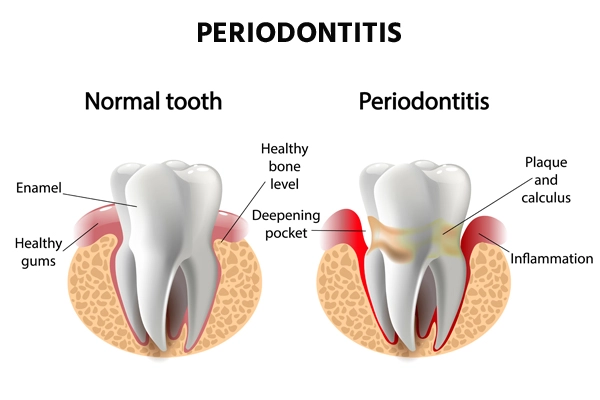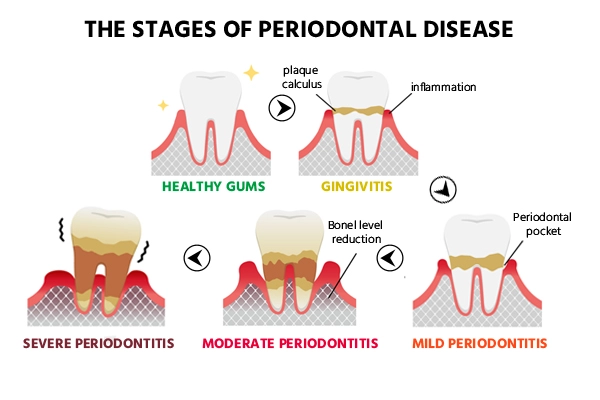Periodontitis Treatment: Symptoms & Causes, Its Stages
Periodontitis, also called dental pyorrhea, is a gum disease. It is a chronic inflammatory condition affecting the oral mucosa around the teeth and is caused by bacterial microorganisms. It is a gum infection where the gums pull away from the teeth, resulting in bone loss, loosening of teeth, or complete loss of teeth.
The early stage of periodontal disease is known as gingivitis, in which the gums can get swollen, red, and sensitive with gum bleeding. Gingivitis further develops into periodontitis (pyorrhea disease). This dental problem is mostly seen in adults.

Periodontal disease can be divided into four stages -
- Periodontitis stage 1 - Initial stage with gum swelling
- Periodontitis stage 2 - Moderate with swelling and gum bleeding
- Periodontitis stage 3 - Severe with chances of tooth loss
- Periodontitis stage 4 - Severe with loss of all the teeth

Secure your health with a second opinion. Make informed decisions and book your appointment today!
Get A Second OpinionSymptoms of periodontal disease
Periodontitis symptoms include -
- Bad breath or halitosis
- Gingival recession
- Swollen gums
- Bleeding gums
- Discolouration of gums: - Bright red, dusky red or purplish gums
- Tender gums
- Lose teeth
- Tooth sensitivity
- Deep pockets, known as periodontal pockets, are formed between the gums and the teeth.
- Pus around the teeth and gums
- Difficulty to chew food
- Spitting out blood when brushing or flossing the teeth
When to see a dentist?
Follow your regular dental checkups. If you detect any periodontal disease symptoms, make a dental appointment with a periodontist as soon as possible. Early periodontitis treatment improves your chances of reversing the damage from this gum disease.
Get the best treatment for periodontitis from our Dentists at Medicover Hospitals.
Causes and Risks
The causes of periodontal disease include:
- The development of periodontitis is triggered by the accumulation of bacteria in the oral cavity.
- Healthy oral bacteria combine with mucus and food particles to create dental plaque, a clingy film on the teeth.
- Regular dental care eliminates plaque, but if left unchecked, it hardens into tartar.
- Only a dentist or hygienist can remove tartar.
- The buildup of plaque and tartar leads to gingivitis, characterized by swollen and bleeding gums.
- Gingivitis can be reversed through proper dental treatment and good oral hygiene practices.
- If left untreated, gingivitis can progress to periodontitis.
Risk factors
Factors that can affect gum health and increase the risk of periodontitis include:
- Gingivitis
- Bad oral care habits
- Smoking
- Chewing tobacco
- Hormonal changes in women (related to pregnancy or menopause)
- Obesity
- Vitamin C deficiency
- Genetics
- Certain drugs can give rise to dry mouth or gum problems.
- Certain conditions can cause low immunity, such as leukaemia, HIV/AIDS and cancer treatment.
- Some illnesses, such as, rheumatoid arthritis, diabetes, alzheimer's disease, osteoporosis, and Crohn's disease.
Prevention
It is possible to prevent periodontitis by practising good oral hygiene and getting regular dental check-ups.
Good oral hygiene - It includes -
- Brushing the teeth for at least two minutes twice daily (in the morning and before bedtime)
- Do flossing once a day
- Drink more water
- Use mouthwash to remove stuck food particles from the teeth and prevent bad breath.
- Eat a healthy diet and reduce intake of sugary food and drink
- Replace the toothbrush every three to four months.
Regular dental health check-up -
Visit your dentist or dental hygienist regularly every six to 12 months. A dental examination is important as it prevents future dental problems, treats tooth cavities thus saving the tooth and instructs about dental cleaning habits.
Diagnosis
To determine whether you have periodontitis and how severe it is, your dentist may do the below things or advise a certain test.
- The dentist will inquire about your medical background, past treatments, dietary habits, and medications to identify any factors contributing to dental issues.
- An extensive assessment of your teeth, gums, and oral cavity will be conducted to examine for plaque, tartar, and gum conditions.
- The depth of gum pockets will be measured by the dentist to screen for periodontal disease. Pockets exceeding 4 mm could suggest periodontitis.
- X-rays assist in detecting early signs of bone loss, gum disease, and tooth damage.
Treatment
Periodontitis treatment may involve less invasive procedures if the gum infection is in its initial stage. It involves -
- Scaling: It is a common dental procedure to remove plaque and tartar from the tooth surfaces and below the gum line. It may be performed using handheld instruments such as a dental scaler and curette or, a laser or an ultrasonic device.
- Root planing: It involves a deeper cleaning with scaling of the root surface to smooth out the root surfaces.
- Antibiotics: Topical or oral antibiotics can help control gum infections. Topical antibiotics for periodontitis are applied in the space between the teeth and gums or into gum pockets after deep cleaning. They are available in gel, chip, and strip form. Oral antibiotics are used to prevent bacterial infections.
Ready to take control of your health journey? Book your appointment now and start your path towards wellness today!
Book an AppointmentSurgical treatments
In the case of advanced periodontitis, dental surgery may have to be done. It includes -
- Flap surgery (pocket reduction surgery) - It is also known as gingivectomy or osseous surgery. It is a dental surgery to clean bacteria present in the space between the gums and teeth in the case of the advanced stage of periodontitis.
- Soft tissue grafts - It is done to halt gum recession and to correct the appearance of the gum line.
- Bone grafting - This procedure helps to repair, or rebuild, bones and prevent tooth loss. It also facilitates the regrowth of natural bone.
- Guided tissue regeneration - It promotes bone regeneration, prevents tooth loss, and helps to maintain the natural aesthetics of the gums and the teeth.
- Tissue-stimulating proteins - It involves applying a special type of gel to an infected tooth root. This gel stimulates the growth of healthy bone and gum tissue.
Dos and Don’ts
Periodontitis is a gum infection that causes inflammation of the soft gum tissue and results in damage to the tooth structure. It starts with the development of bacterial dental plaque found on the tooth surfaces. If it is left untreated in later stages, it can give rise to gingivitis, which will eventually progress into periodontal disease.
|
Do’s |
Don’ts |
|
Maintain dental hygiene |
Smoke or chew tobacco |
|
Limit sugary and junk foods |
Ignore brushing your teeth twice a day |
|
Avoid smoking and chewing tobacco products. |
Eat more sweet foods. |
|
Frequent dental check-ups |
Eat hot and cold food items together |
|
Change your toothbrush every 2-3 months. |
Ignore any underlying symptoms that needs a check-up |
Citations
Periodontal DiseaseFrequently Asked Questions
Can periodontitis be reversed?
Initial stages can be controlled with treatment, while more advanced cases may necessitate surgical procedures to halt further deterioration.
What are the risks of untreated periodontitis?
If left untreated, periodontitis can lead to tooth loss, gum recession, and heightened susceptibility to systemic diseases such as heart disease and diabetes.
What treatments are available for periodontitis?
Treatment options include scaling and root planing to remove plaque and tartar, antibiotic treatments to control infection, gum surgery for severe cases, and regeneration of damaged tissue.
Can periodontitis cause tooth loss?
Yes, if untreated, periodontitis can lead to the loss of teeth. The infection can damage the bone structure that supports the teeth, making them loose and eventually falling out.
How long does it take to recover from periodontitis treatment?
Recovery time depends on the severity of periodontitis and the treatment provided. Most patients recover within a few weeks after non-surgical treatments like scaling and root planing. Severe cases requiring surgery may take longer for complete healing.
